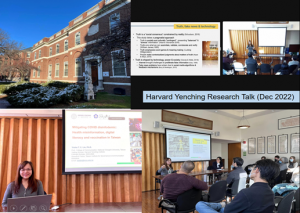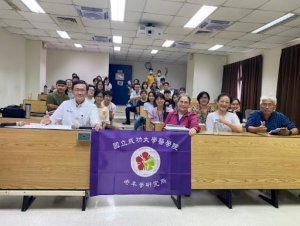I have been teaching ESL for many years, both in the United States and in several foreign countries. My students hail from a variety of ethnic, linguistic, and socioeconomic backgrounds. Over the years, I have taught a wide spectrum of English classes, including speaking, listening, study skills, reading, literature, and composition. When I was informed that I would be teaching an advanced English writing class at National Taiwan Normal University (NTNU) in Taipei as part of my Fulbright award, I was very excited. I looked forward to meeting my Taiwanese students and helping them develop their English writing skills. I had been informed that my class would consist of English majors, so I was even more interested in teaching the class. However, as I have taught many Asian students over the years, I expected that the students in my class would be a bit shy and reluctant to participate actively in class.
Because I have had a great deal of experience teaching many Chinese, Japanese, and Korean students, I naively believed that I understood East Asian culture. My first class at NTNU, however, did not go as I had anticipated. I walked into a classroom filled with nineteen Taiwanese college students, both men and women, who were sitting very quietly and respectfully, waiting for me to begin speaking. The expression on most of their faces was one of fear and apprehension, and I assumed that many of them had never before had a foreign or U.S. professor. I smiled, introduced myself, handed out the syllabi, and began explaining the class expectations and activities. Again, I was met with dead silence and blank stares. Then I asked the students to write a short passage in English, explaining what they expected to learn and how they felt about having a U.S. professor. After they handed in their papers to me, I asked them how they felt about having me as their English writing teacher. One young man slowly raised his hand and said, “Terrified.” I assured him and his classmates that there was nothing to fear and that we would have a good semester together.
The next class went slightly better than the first, but I still felt a great deal of tension and fear from the students. Very few of them volunteered to answer questions or to participate in class activities. They sat quietly at their desks, silently taking notes and staring at me blankly. I began the lesson as usual, having a few of the students read a passage aloud, then asking the class questions about the text and vocabulary. Again, I was met with complete silence. To break this tension, I closed the textbook and started telling them personal stories about my life, especially about my teaching in several different countries. I invited each of them to ask me a question about my stories, and little by little, each student timidly asked me a question in English. By the end of the second class, the students were just beginning to relax and open up, but there was still much work to be done to encourage them to participate fully.
By the third class, the students began to look more relaxed and comfortable having a U.S. professor of English. A few raised their hands to ask or answer questions, and the whole class was a bit more willing to share and discuss their essays with their fellow classmates. The students’ written assignments also showed some improvement, though they were still making many errors in grammar, syntax, vocabulary, and overall writing. Moreover, the amount of participation I expected was still lagging, and the students continued to be reluctant to speak or ask questions in class.
At this point, having become more frustrated with my students’ lack of participation, I decided to examine what was causing this behavior, so I developed an attitude survey designed to reflect how my Taiwanese English students really felt about learning English and what situations made them anxious or uncomfortable. My class spent a lot of time answering the questions on the survey and added their own comments as well.
The students’ responses were surprisingly frank. Many of them responded that they really did not like the English language, or that they were studying it to help them professionally in the future. Others answered that they felt uncomfortable or nervous speaking English in front of others, especially in the presence of a foreign English teacher. Nearly all of them stated that they preferred a Taiwanese teacher to a foreign one, and that they greatly feared making mistakes and appearing foolish when speaking English, especially in the presence of a native speaker. They also asserted that they did not like being chosen to answer questions in class and preferred to remain silent. A few even said they hated English and were studying the language to get ahead in their future careers. Only two of the students responded that they liked English and enjoyed learning and speaking the language.
While I was quite surprised by these results, it gave me a new perspective about my Taiwanese students, their motivations, and their learning styles and preferences. I started to view them through their eyes and their culture. I decided, therefore, to change my teaching methods and tactics to see if it would make a difference in my students’ participation and comfort level in class.
The first change in my teaching methodology was to stop calling on students individually to answer questions. Instead, I divided the class into small groups and had them ask each other questions about the reading passage or assignment. I appointed a leader for each group and rotated the leadership for each class session. I noticed immediately a certain relaxation among my students, and soon they were actively talking to each other, asking questions, laughing, and enjoying themselves. Then I asked each group leader to summarize their discussion. Another group member reported new vocabulary and others provided their own perspectives about the assignment.
The second tactic I employed was to change my methods of evaluating my students’ work and assignments. Rather than giving them a letter or number grade, I made detailed comments about the strengths and weaknesses of their writing and allowed them to revise and improve their work for the next class. I also encouraged them to email me and their classmates to discuss their assignments online.
Finally, I reacquainted myself with the body of second language research concerning the affective domain and cultural considerations in English language learners, particularly Asian adults. Stephen Krashen’s affective filter hypothesis, in particular, asserts that second language learners who possess a high level of language anxiety, fear of making errors, a lack of self-confidence, and low motivation generally perform less satisfactorily in an ESL class than those who are more assertive and confident. Moreover, this affective filter influences ESL learners’ motivation and their willingness to participate and take risks when learning a second language. I also read Geert Hofstede’s book, Cultural Consequences, and Keiko Khoo’s article, Nonverbal Communication Across Eastern-Western Cultures,in order to become more familiar with some of the cross-cultural behavior and expectations of East Asian learners. As a result, I now better understand how the affective filter and cultural differences influence students’ attitudes and willingness to participate, and subsequently how teachers must make a greater effort to lower their students’ anxiety and increase their comfort level in the classroom.
The final results of these changes in my teaching strategies and expectations have been quite successful. My students are now much more willing to participate in class, ask questions, voice personal opinions, and even contradict me when they do not agree with something I mention. They seem a great deal more relaxed and open about communicating with me and their classmates, and they have even told me that they enjoy my class more since I changed my teaching methodology.
What I have learned from this unique experience of teaching English writing to English majors in a Taiwanese university is that ESL instructors often have a preconceived notion of how their students should learn, participate, or interact with each other and with their teachers. Many Western teachers, including me, expect their students to be active participants in class, to speak and ask questions openly, and to have little fear of making errors. In Taiwan, however, saving face is an important cultural concept, and I, as a ESL teacher from the United States, should comprehend, honor, and respect this aspect of Asian culture. Moreover, since I now have a better understanding of the underlying attitudes, expectations, and motivations of my Taiwanese students regarding learning English, I can modify my teaching and evaluation methods and adjust my teaching strategies to their learning styles, preferences, and needs. In summary, the experiences I have had teaching advanced English writing this past semester in a Taiwanese university have taught me to be more flexible, accepting, and willing to improve my own teaching methods and to increase my understanding of adult Taiwanese English language learners.
References
Hofstede, Geert. (1980). Culture’s Consequences: International Differences in Work-Related Values. SAGE Publications.
Krashen, Stephen D. (1988). Second Language Acquisition and Second Language Learning. Prentice Hall International.
Khoo, Keiko. (2007). “Nonverbal Communication Across Eastern-Western Cultures: Facial Expressions During Interviews of Japanese Students.” New Horizons in Education, 55(1), 37-50.







